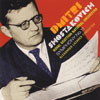Shostakovich Symphony No 11
A sonic spectacular – but unable to plumb the depths of its predecessors
View record and artist detailsRecord and Artist Details
Composer or Director: Dmitri Shostakovich
Genre:
Orchestral
Label: Linn Records
Magazine Review Date: 9/2005
Media Format: Super Audio CD
Media Runtime: 61
Mastering:
Stereo
DDD
Catalogue Number: CKD247

Tracks:
| Composition | Artist Credit |
|---|---|
| Symphony No. 11, 'The Year 1905' |
Dmitri Shostakovich, Composer
Alexander Lazarev, Conductor Dmitri Shostakovich, Composer Royal Scottish National Orchestra |
Author: David Gutman
Do we need another Eleventh? Whether you take its composition as an act of conformism, a coded indictment of Soviet tyranny, ‘a film-score without the film’ or something rather more subtle (David Fanning’s booklet-note for Linn is excellent on all this), it probably isn’t a piece for everyday listening.
That said, it is difficult to think of an interpretative tendency that hasn’t been championed on disc. The frenzied hysteria whipped up by Kondrashin (Melodiya, 11/94 – nla) in a performance lasting less than 54 minutes is remote indeed from the stoicism of Rostropovich’s latest and longest, clocking in at 72-plus. Both the highly regarded Columbia version from Cluytens, taped while the composer was in Paris, and Stokowski’s, made even earlier for Capitol, on the heels of the American premiere, fall somewhere between these extremes. Stokowski’s recording was a sonic spectacular in its day, as Lazarev’s is in ours, so it is interesting to note how priorities have changed.
Inevitably, the latter is afforded more natural balances and a greatly wider dynamic range, whereas Stokowski is sometimes at pains to add colour and character to what’s there in the score. All the same, Lazarev’s reading seems less remarkable. The playing is committed and proficient, a timely tribute to his recent period in charge of the orchestra, the sonority a little light.
The scene is set efficiently and with carefully tuned timps, The Ninth of January is brilliantly dispatched (nicely sneering trombones from 13’27”) and the finale goes with suitable élan, though you might not care for the pitch of the bells at the close. The controversial element is the third movement, too fast to admit either Rostropovich’s personalised gravitas or Stokowski’s generalised warmth, and with a big, speaker-busting climax. In sum, this is what would once have been called a demonstration disc, exceptionally well produced and presented.
That said, it is difficult to think of an interpretative tendency that hasn’t been championed on disc. The frenzied hysteria whipped up by Kondrashin (Melodiya, 11/94 – nla) in a performance lasting less than 54 minutes is remote indeed from the stoicism of Rostropovich’s latest and longest, clocking in at 72-plus. Both the highly regarded Columbia version from Cluytens, taped while the composer was in Paris, and Stokowski’s, made even earlier for Capitol, on the heels of the American premiere, fall somewhere between these extremes. Stokowski’s recording was a sonic spectacular in its day, as Lazarev’s is in ours, so it is interesting to note how priorities have changed.
Inevitably, the latter is afforded more natural balances and a greatly wider dynamic range, whereas Stokowski is sometimes at pains to add colour and character to what’s there in the score. All the same, Lazarev’s reading seems less remarkable. The playing is committed and proficient, a timely tribute to his recent period in charge of the orchestra, the sonority a little light.
The scene is set efficiently and with carefully tuned timps, The Ninth of January is brilliantly dispatched (nicely sneering trombones from 13’27”) and the finale goes with suitable élan, though you might not care for the pitch of the bells at the close. The controversial element is the third movement, too fast to admit either Rostropovich’s personalised gravitas or Stokowski’s generalised warmth, and with a big, speaker-busting climax. In sum, this is what would once have been called a demonstration disc, exceptionally well produced and presented.
Discover the world's largest classical music catalogue with Presto Music.

Gramophone Digital Club
- Digital Edition
- Digital Archive
- Reviews Database
- Full website access
From £8.75 / month
Subscribe
Gramophone Full Club
- Print Edition
- Digital Edition
- Digital Archive
- Reviews Database
- Full website access
From £11.00 / month
Subscribe
If you are a library, university or other organisation that would be interested in an institutional subscription to Gramophone please click here for further information.




